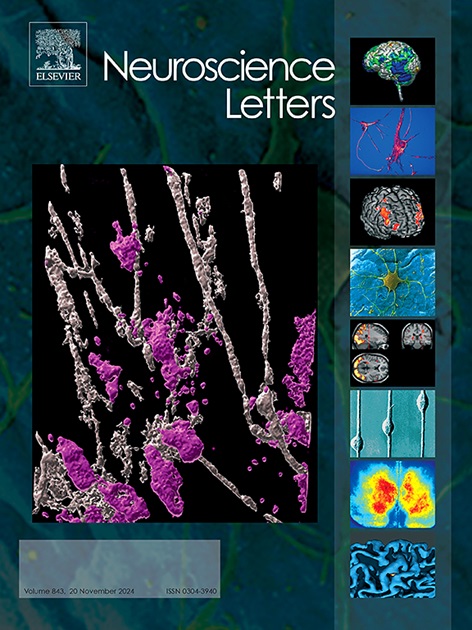Inflammatory pain modifies reward preferences from larger delayed to smaller immediate rewards in male rats
IF 2
4区 医学
Q3 NEUROSCIENCES
引用次数: 0
Abstract
Self-control underlies goal-directed behavior in both humans and rodents. The ability to balance immediate and delayed gratification is essential for fine-tuning decision-making processes to achieve optimal rewards. Although delayed gratification has been extensively studied using human neuropsychological assessments, brain imaging techniques, and preclinical research, the impact of chronic pain on these processes remains poorly understood. In this study, we successfully trained male rats to perform a custom delayed gratification task (DGt) to evaluate time-reward gratification associations. The task required rats to choose between two levers associated with distinct schedules of reward delivery and magnitude. Behavioral performance was assessed within subjects following the induction of inflammatory chronic pain using the complete Freund’s adjuvant (CFA) model. Our findings revealed that CFA-treated rats developed mechanical allodynia and demonstrated a strong preference for small and immediate rewards. In contrast, saline-treated control rats exhibited a more balanced choice profile, indicative of intact self-control. Collectively, these results offer novel insights into how chronic inflammatory pain disrupts time-reward preferences and impairs self-control mechanisms.
炎症性疼痛改变了雄性大鼠的奖励偏好,从较大的延迟奖励到较小的即时奖励
在人类和啮齿类动物中,自我控制是目标导向行为的基础。平衡即时和延迟满足的能力对于微调决策过程以获得最佳回报至关重要。尽管延迟满足已经通过人类神经心理学评估、脑成像技术和临床前研究进行了广泛的研究,但慢性疼痛对这些过程的影响仍然知之甚少。在这项研究中,我们成功地训练雄性大鼠执行自定义延迟满足任务(DGt)来评估时间-奖励满足关联。这项任务要求大鼠在两种与不同的奖励交付时间表和大小相关的杠杆之间做出选择。在炎症性慢性疼痛诱导后,使用完全弗氏辅助(CFA)模型评估受试者的行为表现。我们的研究结果显示,cfa治疗的大鼠出现机械异常性疼痛,并表现出对小而即时奖励的强烈偏好。相比之下,盐水处理的对照大鼠表现出更平衡的选择谱,表明完整的自我控制。总的来说,这些结果为慢性炎症性疼痛如何破坏时间奖励偏好和损害自我控制机制提供了新的见解。
本文章由计算机程序翻译,如有差异,请以英文原文为准。
求助全文
约1分钟内获得全文
求助全文
来源期刊

Neuroscience Letters
医学-神经科学
CiteScore
5.20
自引率
0.00%
发文量
408
审稿时长
50 days
期刊介绍:
Neuroscience Letters is devoted to the rapid publication of short, high-quality papers of interest to the broad community of neuroscientists. Only papers which will make a significant addition to the literature in the field will be published. Papers in all areas of neuroscience - molecular, cellular, developmental, systems, behavioral and cognitive, as well as computational - will be considered for publication. Submission of laboratory investigations that shed light on disease mechanisms is encouraged. Special Issues, edited by Guest Editors to cover new and rapidly-moving areas, will include invited mini-reviews. Occasional mini-reviews in especially timely areas will be considered for publication, without invitation, outside of Special Issues; these un-solicited mini-reviews can be submitted without invitation but must be of very high quality. Clinical studies will also be published if they provide new information about organization or actions of the nervous system, or provide new insights into the neurobiology of disease. NSL does not publish case reports.
 求助内容:
求助内容: 应助结果提醒方式:
应助结果提醒方式:


